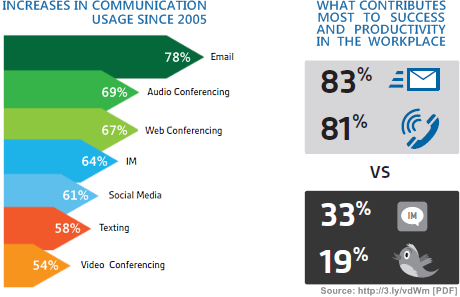Study: 'Employees not sociable at work'; Gen Y needs to change everything

A new study by Plantronics focusing on the communication habits in the workplace show that social networking, either on Facebook or Twitter or on business networking sites like LinkedIn, are the least constructive activities for business productivity.
The study conducted over the web by online survey showed once again the stark differences between the older and younger generations, in that the Generation X are still focused on what we would now consider 'outdated' technologies.
The report can be found here, by skipping through the typical online registration 'Oxbridge 2.0 pleasantries'.
What's been said: The Generation X
Email unsurprisingly has shot through through the roof in the last five years, increasing by over 70% according to the poll, which surveyed 1,800 knowledge workers in medium-sized and large businesses. Even though video and audio conferencing is on the rise, email remains at the top spot with mobile devices being able to take our written conversations anywhere we go.However half of the 90% of those surveyed in the enterprise environment stated that they spend nearly a quarter of their working hours off site, making the need for mobile devices connected up to their corporate communications networks all the more important. But with over-the-air bandwidth being sluggish at the best of times (anybody on AT&T can confirm this) mobile email access is the only viable option.
Texting is limiting, social media is public and too 'personal' and instant messaging though can be useful, is often not incorporated into the enterprise world.

The way we communicate entirely depends on the profession that we enter into. Those working in policing and intelligence will most likely prefer text-based communications as it enables quick, effective referencing to on-demand data.
Journalists will usually prefer phone conversations or face-to-face over any text based communications because it enables vocal inflections to be detected; stutters, stammers and physiological impairments, because frankly we like to catch people out. Press and public relations, publicists and corporate spokespeople will of course in light of the aforementioned prefer email and text-based communications.
The study goes on to further purport the theory that though there are more ways to communicate than before, most prefer the traditional methods even though they often cause confusion. Email works only so well on the basis that the two or more people in contact are on a level playing field emotionally, professionally and in terms of level of knowledge, language and skill being used.
Using buzzwords and acronyms out of context or in an illegible way requires the recipient to spend more time emailing back and asking for clarification, which causes an imbalance in the working relationship; the person losing self-confidence while the other gains higher ground by exerting even more unnecessary communication to make up for their previous misgiving. A phone conversation will lessen this a great deal.
What has and will change: The Generation Y
As the Generation Y slowly start to integrate themselves as part of the 'legitimate' workforce, the numbers will change over the years and will probably only make sense in hindsight. Though email is still a predominate way of communicating because it's effectively free (though many will argue), it's secure enough and it is more mobile than it has ever been. It also has its barriers which keep this socio-personally restrictive bunch of people separated from the actual world.Video, web and audio conferencing allows the social curtain to be brought down and open communications to push forward. It is designed to get people working together, chipping in on an ad-hoc basis, allowing free thought and uncensored imagery to fall through, unlike email which is doctored and carefully planned - manipulated almost, to appeal to the recipient.
The Generation Y will most likely not take on these pre-existing corporate ideologies and will use the innate skills and processes they are already used to; text messaging and Twitter though restrictive, it allows us to communicate our points effectively, swiftly, but more importantly clinically, which is something we have yet as a generation to fully engage with or comprehend.
Considered in my view, the study puts forward a simple enough excerpt which states:
"Posting or reading updates on popular social/professional networking sites and blogs was identified as the least critical communications activity for business productivity".
But as the Generation Y know this playing field so much better, not only the psychology behind the terms used and the methods of accessing these resources, these abilities to use non-traditional means of communication are the driving force behind an entire generation.
The boundaries are blurred between business and personal. But as we all know, the workplace is a sociable place. If the office or workplace that we see today remains as clinical and as clear cut where only the professional within can be expressed, then the values of this upcoming generation will be nullified and negated and the relics of the past: discrimination of sexual orientation, pay inequality to the gender glass ceiling that will never die out.